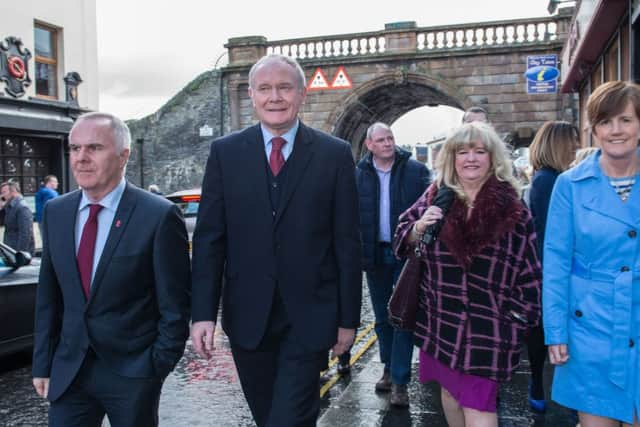Corporation tax affordable, but Brexit risks jobs boost: McGuinness


Rivals have accused Sinn Fein of double speak on the political agreement to bring the rate down to 12.5 per cent, claiming its position has wavered due to unease about the reaction of its voter base to a policy that would see millions cut from public spending to drop taxes for big businesses.
As the party outlined its manifesto, Mr McGuinness said cutting the rate to 12.5 per cent by 2018 was always based on it being affordable.
But he added: “I do think it will be affordable.”
Advertisement
Hide AdAdvertisement
Hide AdHe said the reason he supported the move was because it could create potentially 37,000 jobs through new investment.
“The position is clear – there is no ambiguity in Sinn Fein’s position. We along with all the other parties have signed up to a reduced rate of corporation tax of 12.5 per cent by 2018,” he said.
But the Sinn Fein veteran claimed a Brexit could undermine Northern Ireland’s ability to attract new investors to set up in the Province.
“Every major grouping of potential foreign direct investors that myself and other leaders from the north met in the United States, the question always came up as to what would happen in relation to Europe,” he said.
“So there is a linkage between the two.”
Advertisement
Hide AdAdvertisement
Hide AdMr McGuinness also expressed optimism that an impasse between his party and the British Government that has held up the introduction of new mechanisms to address the toxic legacy of the Troubles could be resolved in the near future.
The wrangle centres on the shape of an appeals mechanism for victims to challenge the state over non-disclosure of sensitive documents related to historical killings.
“I would have preferred that solution to have been found before the election but for some reason the British government didn’t want to go ahead with it before the election,” Mr McGuinness claimed.
“But I believe it will be addressed immediately after the election and I do hope that a solution will be found.”
Advertisement
Hide AdAdvertisement
Hide AdMr McGuinness said parties entering the new powersharing Executive next month had to prove to the public they could work together.
“For me, in terms of how we go forward, what is very crystal clear is, as a result of the very difficult circumstances that the political process faced for a range of reasons over the course of a three-year period, we need to get back to convincing the public that we as politicians and political parties actually do have the ability to work together on the basis of respect and equality – that is the big challenge facing us,” he said.
The Deputy First Minister said his party would consider taking on an economic-based portfolio when it came to the allocation of ministries.
“I am looking at a range of departments and certainly and economic department is on that list,” he said.
Advertisement
Hide AdAdvertisement
Hide AdSinn Fein’s manifesto set out its pledges to the electorate in the form of a 10-point programme:
• Economy – create 50,000 new jobs;
• Housing – build 10,000 new social and affordable homes;
• Health – £1 billion additional health spending over next Assembly term;
• Welfare – £500 million to support those losing out as a result of changes to the welfare system;
• Education – increase to £525 million spend on childcare and early child development initiatives;
Advertisement
Hide AdAdvertisement
Hide Ad• Infrastructure – £6 billion to improve roads, transport and public services;
• Rural - extend fast-speed broadband to rural communities;
• Tackling crime – ring fence funding for frontline policing;
• Equality – bring forward legislation on marriage equality as first act in the next Assembly;
• Building momentum toward Irish unity – continue to “build support” for Ireland-wide referendum.